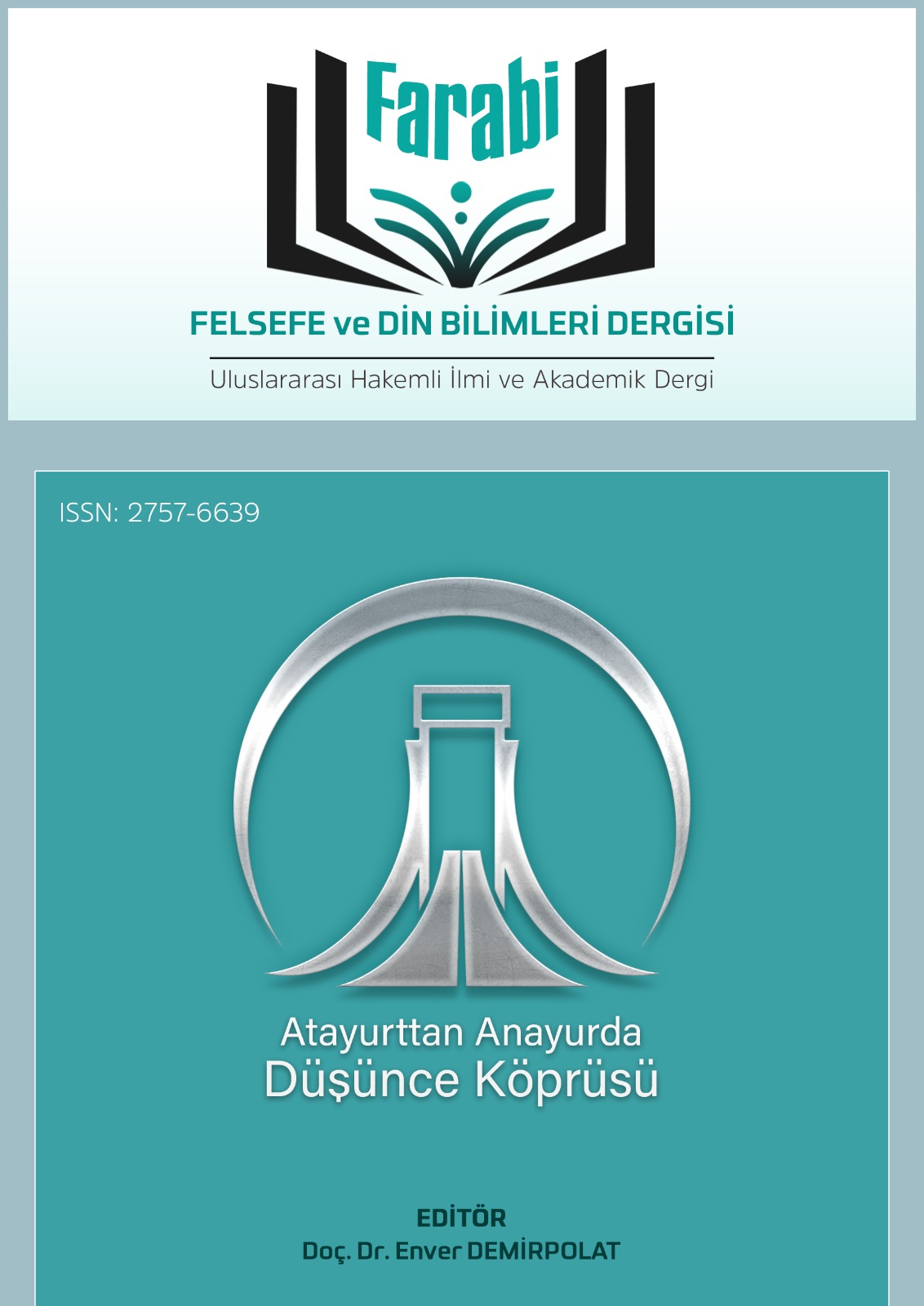Author :
Abstract
Bilge Kağan'a (Ö. 734) göre devlet başkanı “bilge” veya “biligsiz” olur. İdeal devlet başkanları "bilge ve alp" niteliğine sahip olup, "il tutup törü iderler": Devleti kurarlar ve devletin yasalarını/töresini oluştururlar. Onlar bilge oldukları için isabetli hükümler verir, doğru seçimlerde bulunur. Bu hüküm ve seçimler halkın bayındır olmalarını sağlar. Bilge kağanların belirlediği esastan/töreden ayrılan kağanlar "biligsiz" iş tutar, hükümleri ve seçimleri isabetsiz olur ve sonuçta halkı da devleti kaybeder. Onları yeniden toparlamanın yolu Bilge kağanlarca düzenlenmiş töreye bağlanmaktan geçer.
Farabi’ye (Ö. 950) göre devlet başkanı güttükleri gayeye göre fazıl ve cahil olur. İdeal başkan fazıl gaye güdüp, sağlıklı düzenlemeler yapan başkandır. Onun birçok özellikleri vardır. Her şeyden önce o "hikmet" sahibidir. Kendisi ve halkı için gerçek mutluluğa ulaştıracak düzenlemeler yapar. Sahip olduğu "hikmet"i, nazari ve ameli yönüyle toplumda da meydana getirir. Böyle bir toplum fazıl toplum, devlet de fazıl/ideal bir devlet olur.
İki düşüncede de iyilik ve yetkinliğin toplumda yukarıdan aşağıya aktarıldığı fikri vardır. Yine, Bilge Kagan’daki bilge başkan fikri ile Farabi’deki hikmet sahibi başkan fikri, devlet başkanının hangi niteliğe sahip olması gerektiğini çok açık ve ortak bir şekilde ortaya koymaktadır. Ayrıca, toplumsal iyiliğin, bilge başkanların koyduğu töreye/kanunlara uymaktan geçtiği, toplumsal kötülüğün de bilgelik ve hikmete göre konulmuş kurallardan ayrılmakla ortaya çıktığı fikri vardır. Bilge Kağan daha çok dünyevi iyilik üzerinde dururken Farabi dünyevi ve uhrevi iyilik üzerinde durmaktadır. Farklı yönler mevcut olmakla birlikte her ikisinin de benzer veya ortak düşünceleri, ikisini de Türk Devlet Geleneğinde buluştuğunu göstermektedir.
Keywords
Abstract
According to Bilge Kağan (d. 734), the president of state becomes "wise" or "ignorant". The ideal presidents of state are "wise and brave". They establish the state and form the laws or customs of the state. Because they are wise, they make correct judgments and make right choices. These provisions and elections ensure that the people prosper. The president who leave the laws or customs of the state which determined by the wise presindents do things in ignorance, his rulings and elections are inaccurate and as a result, their people lose the state. The way to get them together again is through being connected to the custom arranged by wise presidents.
According to Farabi (d. 950), the presidents becomes virtuous or ignorant according to their purpose. The ideal president is one who pursues a virtuous goal and makes healthy arrangements. It has many properties. First of all, he is a "wisdom". He makes arrangements that will bring true happiness for himself and his people. He brings about the "wisdom" they possess in the society in terms of theoretical and practical. Such a society would be a virtuous society, and the state would be a virtuous / ideal state.
Both opinions have the idea that goodness and competence in society are transferred from top to bottom. Again, the idea of the wise president in Bilge Kagan and Farabi reveals very clearly what qualification a head of state should have. In addition, it can be seen the idea that social good comes from obeying the rules of wise presidents, and that social evil comes about by departing from the rules established according to wisdom. While Bilge Kağan focuses more on earthly goodness, Farabi emphasizes on earthly and ethereal goodness. Similar or common ideas of both show that they both meet in the Turkish State Tradition.
Keywords
- Aydınlı, Yaşar. (1987), Farabi’nin Siyaset Felsefesinde İlk Başkan (er-Reis el-Evvel) Kavramı”,
- Aydınlı, Yaşar. (1987), Farabi’nin Siyaset Felsefesinde İlk Başkan (er-Reis el-Evvel) Kavramı”, Uludağ Üniversitesi İlahiyat Fakü ltesi Dergisi, 2; 291-302.
- Bayraklı, Bayraktar. (1983), Farabi’de Devlet Felsefesi, Doğuş yayıncılık, İstanbul.
- Cihan, A. Kamil. (2004/1) “Farabi’nin Siyaset Felsefesinde Türk Devlet Anlayışının İzleri”, Bilimname, IV, 17-31.
- ----- (2002/) “Orhon Yazıtlarındaki Bilge Terimi Üzerine”, Felsefe Dünyası, 35; 89-101.
- Demirpolat-Enver- Ülger Mustafa, (2020) “Farabi’de Reis, Filozof, Hakan ve kanun Koyucu kavramları”, Muallim-i Sani Uzlukoğlu Farabi, İstanbul: Kitap yayınevi.
- Erdoğan, İsmail, “(2020) “Farabi’nin Faal akıl Anlayışının Eski Türk düşüncesi ile Bağlantısı Üzerine”, Muallim-i Sani Uzlukoğlu Farabi, İstanbul: Kitap yayınevi.
- Farabi, (1985). Kitabu Arai Ehli’l-Medineti’l-Fadıla, Neşir: A.N. Nadir, 5. Baskı, Beyrut: Darul- Meşrik
- -----(1991). Kitabu’l-Mille, Neşir: Muhsin Mehdi, Darul-Meşrik, Beyrut, ikinci baskı.
- ----- (1992/2). Tahsilu’s-Seade, el-A’malu’l-Felsefiyye içinde, Neşir: Dr. Cafer Alu Yasin, Beyrut: Darul-Menahil.
- ----- (1992/2) Kitabu’t-Tenbih Ala Sebili’s-Seade, el-A’malu’l-Felsefiyye, Neşir: Dr. Cafer Alu Yasin, Beyrut: Darul-Menahil.
- ----- Fusulun Müntezaa (1986). Neşir: Dr. Fevzi M. Neccar, 2. Baskı, Beyrut: Darul-Meşrik,Gumilöv, L.N. (1999). Eski Türkler, Çev. D. Ahsen Batur, İstanbul, Birleşik yayıncılık.
- Korkut, Ş. (2012) “Meşşai Geleneğin Kurucu Filozofu: Farabi”, İslam Felsefesi Tarihi, I, Editör: B. Ali Çetinkaya, Ankara: Grafiker Yayınevi.
- Küyel, M. T. (1984/1) “Kut, Farabi ve İbn Sina’daki al-Akl al-Fa’al için bir Temel Oluşturabilir mi?”, İbn Sina Doğumunun Bininci Yılı Armağanı, Derleyen: Aydın Sayılı, Ankara: TTK.
- ----- (1984/2)“İbn Sina’nın al-Akl al-Fa’al’ine Bir Adım Olarak Farabi’de Siyaset” İbn Sina Doğumunun Bininci Yılı Armağanı, Derleyen: Aydın Sayılı, Ankara: TTK Basımevi,
- ----- (1994). “Bilge Kağan bir Filozof Arhont mudur”, XI. Türk tarih kongresi Cilt II, Ankara: TTK.
- Tekin, T. (1988). Orhon Yazıtlar, Ankara: TTK.
- Walzer, Richard. (1997) “Açıklama ve Yorumlar”, İdeal Devlet (el-Medinetü’l-Fadıla), Çev. Ahmet Arslan, Ankara, Vadi yayınları,.
